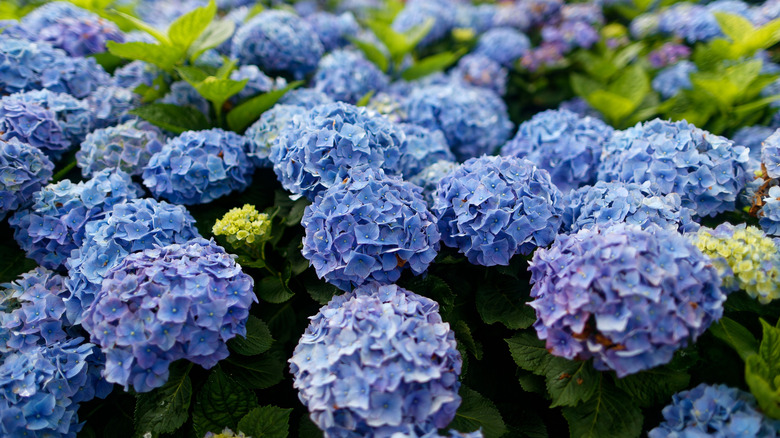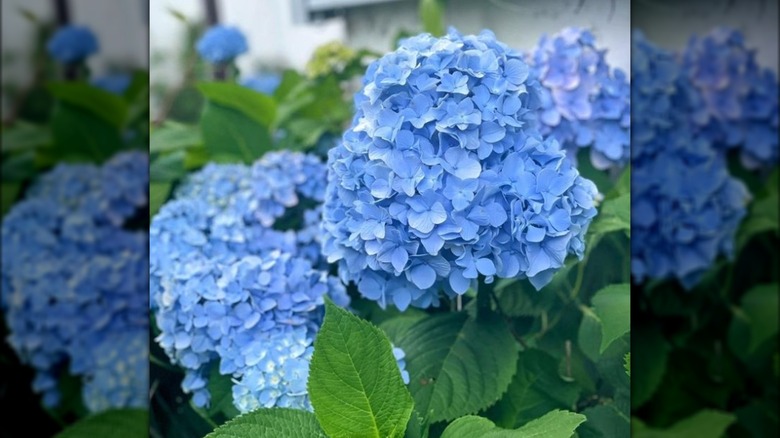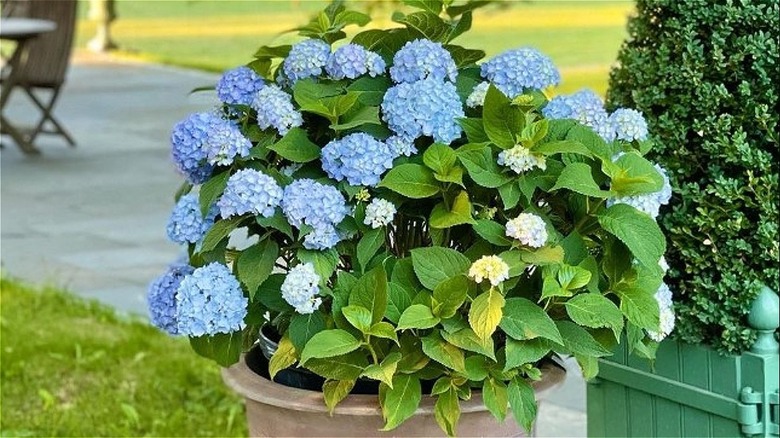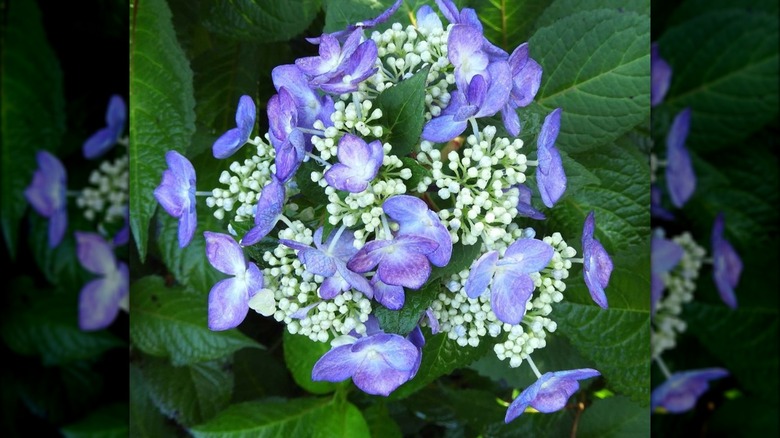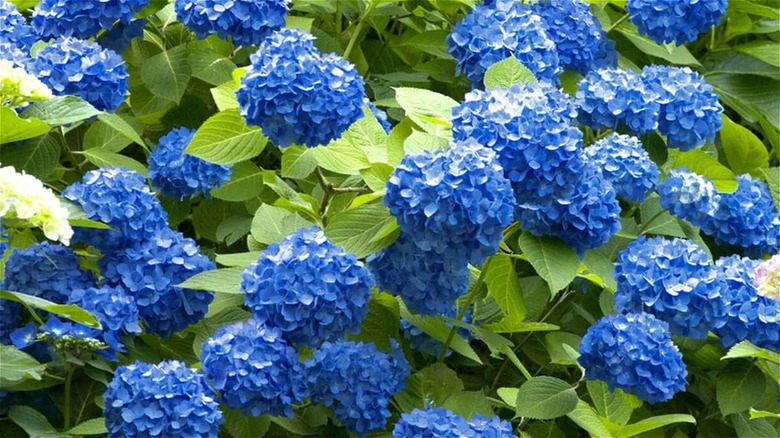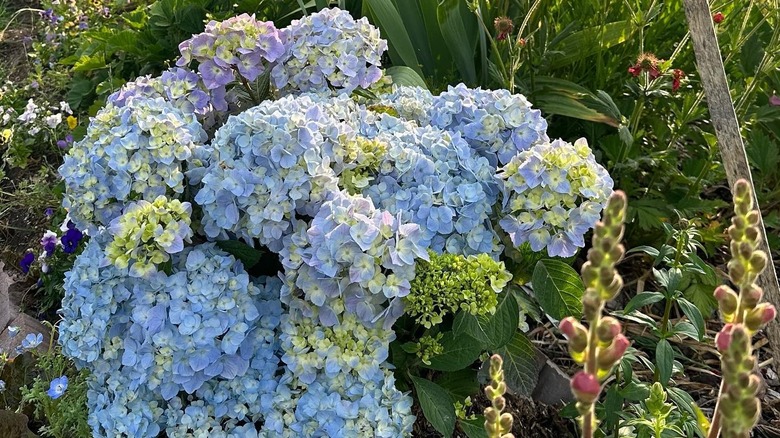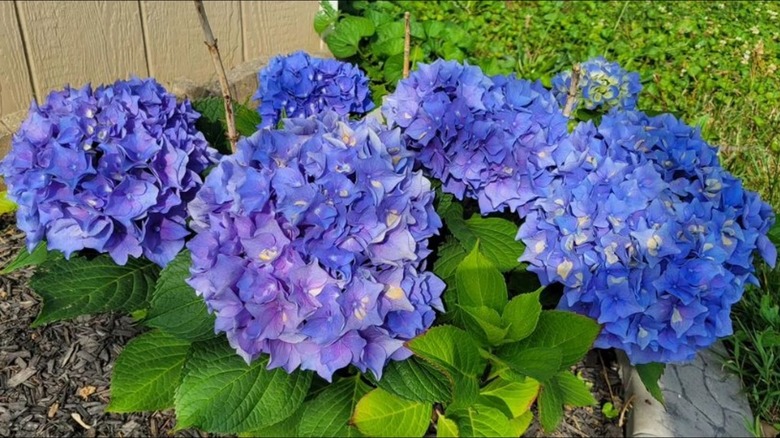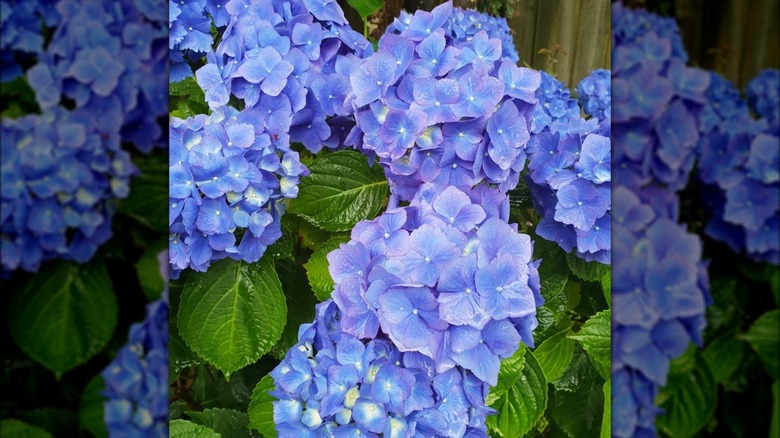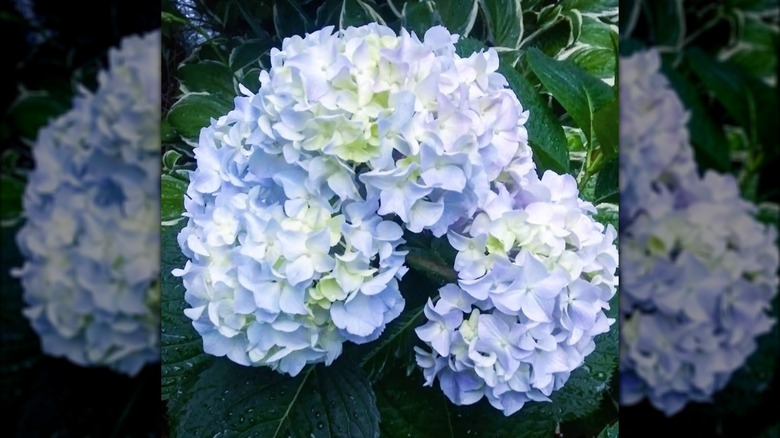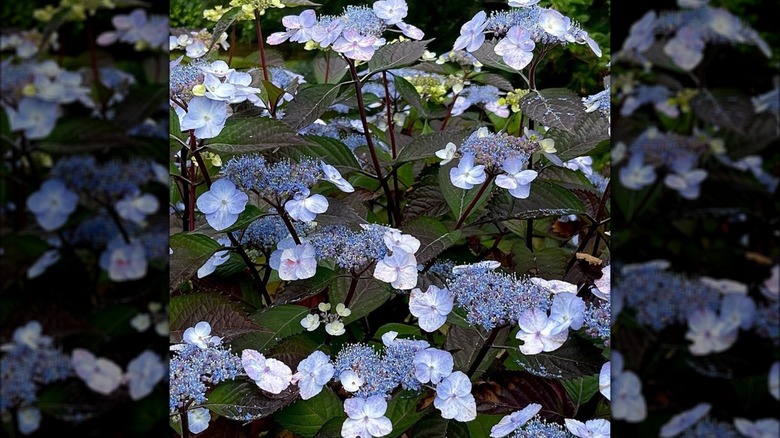The Best Blue Hydrangea Varieties To Have In Your Garden
Hydrangeas (Hydrangea macrophylla) are some of the most eye-catching plants to keep in your garden, especially during the spring, summer, and early fall months when they erupt with bountiful pastel flowers that come in many colors. Those with blue blooms will provide your garden with some cool-toned beauties. You might have heard that acidic soil will turn your hydrangeas from pink to blue, and this is true! However, not all hydrangea varieties will turn blue, and some will develop more vibrant hues than others. For example, white hydrangea types can never turn blue no matter how acidic their soil is, and some color-changing varieties will only fade to purple.
If you want to enjoy true blue flowers in your garden, you'll need to start with the right hydrangea variety. For the best results, your soil also needs to be acidic, at a pH level of 5.5 or lower. There are dozens of blue-turning hydrangea varieties out there, but the following types are some of the best ones for striking shades of blue. Plant these hydrangeas in late spring or early fall to enjoy the flowers in the coming spring and summer seasons.
1. Nikko Blue
If you're looking for deep blue flowers, look to the Nikko Blue hydrangea. This popular variety is easily recognizable by its orb-like flowers that bloom in early summer. Nikko Blue hydrangeas grow well in rich and moist but well-draining soil with full sun or partial shade. Soil with a highly acidic pH will bring you the most vibrant shade of blue, and in more neutral or alkaline soil conditions the flowers can develop a tinge of pink. Nikko Blue will re-bloom on old wood growth, so wait until after buds have formed to avoid any pruning mistakes.
2. Endless Summer
Endless Summer is a type of hydrangea that can showcase a wide range of colors, including a lovely blue. When it's mature, this hydrangea variety is typically between 3 and 5 feet tall, making it a perfect shrub for growing in containers or filling in awkward corners of your garden. Endless Summer hydrangeas are ideal for hardiness zones 4 through 9, prefer loamy, moist soil, and require acidic conditions to develop blue blooms. Like other mophead varieties, Endless Summer flowers on the previous year's old growth and should be pruned after flowers have finished coming in.
3. Endless Summer Twist and Shout
Endless Summer Twist and Shout might have a similar name to the original Endless Summer hydrangea, but these flowers couldn't be more unique. Twist and Shout is a type of lacecap hydrangea, with delicate bead-like buds and enchanting "shouts" of blue flowers. These blooms can range from a soft periwinkle blue to a deep pink, depending on the soil acidity. If you're lucky enough to have highly-acidic soil, these flowers will show off periwinkle hues. Like most hydrangeas, this plant will be happy in hardiness zones 4 through 9 with well-draining soil and partial sun.
4. Générale Vicomtesse DeVibraye
Générale Vicomtesse DeVibraye is a French hydrangea variety with an undeniably fancy name and even fancier blooms. Featuring bright blue flowers, this hydrangea is generally easy to care for and can survive in both cold and hot weather. Générale Vicomtesse DeVibraye will reach about 4 to 6 feet tall when mature and thrives in partially-shaded areas like the dappled light under a small tree. This variety tends to bloom a little later than others, producing gorgeous flowers from summer through early fall.
5. Let's Dance Sky View
Let's Dance Sky View is one of the easiest hydrangeas to turn into a blue color. This fast-growing variety is hardy under a range of conditions and is resistant to droughts, heat, and disease. When grown in acidic soil, the blooms will feature soft blue petals offset by pretty yellow-green centers. Let's Dance Sky View tends to grow slightly shorter than other varieties, reaching about 2 to 4 feet tall and up to 4 feet wide when mature. This plant prefers full sun to partial shade and thrives in hardiness zones 4 through 9.
6. Let's Dance Rhythmic Blue
Let's Dance Rhythmic Blue features some truly fascinating star-like blooms in a rich, vibrant violet-blue. This hydrangea grows close to the ground, reaching about 2 to 3 feet tall. The compact plant usually blooms twice throughout the growing season, once in early summer and then again in early fall. Because of its smaller stature, pruning the Let's Dance Rhythmic Blue hydrangea isn't really necessary but can be done if you want to encourage fresh growth. To help the blooms develop their most vibrant blue possible, add aluminum sulfate to the soil in early spring.
7. Mathilda Gutges
Mathilda Gutges is another hydrangea variety with extremely deep blue flowers. These blooms tend to have subtle pink overtones that make them look as if they're glowing. Petals of the Mathilda Gutges hydrangea blooms have almost serrated edges and can sometimes have a curly, tightly-bunched appearance. This plant will thrive in full sun to partial shade, as long as temperatures don't get too hot in the afternoon. Mathilda Gutges is one of the best hydrangea varieties to grow for cuttings and indoor floral arrangements.
8. Penny Mac
The Penny Mac hydrangea tends to have daintier petals than some other varieties, giving the flowers a lush and textured appearance. Each individual flower has a creamy white center and can come in a wide range of colors, from buttery white to pink, purple, and blue. Sometimes different shades can even grow on the same plant! Penny Mac is one of the larger types, growing up to 6 feet tall and 4 feet wide. To care for this hydrangea, grow in partial shade, water at the base, and add aluminum sulfate to the soil to encourage blue flowers.
9. Bluebird
Some gardeners may prefer a lacecap hydrangea to traditional chunky blooms. The Bluebird hydrangea is perfect for a touch of delicate periwinkle blue. Similar to the Endless Summer Twist and Shout, the Bluebird variety has sprays of blue buds with large flowers scattered throughout. For a Bluebird, however, flowers will form a ring around the tight lacey buds. The leaves of the Bluebird hydrangea also provide some unique color, with deep greens and moody maroons. This variety is a popular choice for hedges or border planting and grows well with morning sunlight and partial shade during the day.
